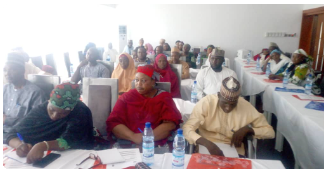Published
9 months agoon

A validation meeting on assessment of Public toilets in markets and motor parks, including user feedback, was recently held in Bauchi organised by Water Aid Nigeria in collaboration with the Women Development Association for self- sustenance (WODASS) including partnership with the Bauchi State Environmental Protection Agency (BASEPA)
THE NIGERIA STANDARD gathered that the project known as the Impact Accelerator is being implemented in Bauchi State by Water Aid Nigeria in collaboration with the Bauchi State government through the Ministry of Environment (BASEPA) and Bauchi State Rural Water Supply and Sanitation (RUWASSA).
The aim of the project is to ensure that women and girls are able to use toilets in public places without worries and concern with funding from a donor from Australia called “Who gives a crap”
The meeting was meant to validate the findings of toilet assessment taken in 6 local government areas of Shira, Katagum, Ningi, Misau, Bauchi and Alkaleri from 54 public toilets as part of efforts to establish a User Center design of public toilets and end open defecation in the state.
Mrs Sarah Mkeryi Amahson, who is the Water Aid Nigeria Lead Consultant, while presenting the report on the findings on public toilets in the state at Yimir Hotel in Bauchi, said that the aim of the research in the 6 LGAs was to produce a report based on the analysis of the assessments to identify the general features of toilet as well as arrangements for tariffs, operation and maintenance that will enable women and girls to access toilets in public places with dignity and privacy, including recommendations for appropriate arrangements for participation in decision making and customer feedback regarding the toilets.
She informed that the method of the research involved the collection of quantitative data using a structural questionnaire survey in addition to facility usability testing that involved users making use of the toilets while notes are being taken by either a male or female facilitator about the ease with which the facilities are used and associated challenges.
According to the Consultant, in many of the toilets visited, the needs of girls and women were not taken into consideration, including those with disabilities. Factors such as lack of awareness about female needs for public toilets, lack of enough space to demarcate sections for females and persons Living with Disabilities, perception that public toilets were originally designed for men and lack of regulations to guide toilet operators are contributing to the challenge.
Sarah said that government can be influenced to prioritise the provision of safe and hygienic public toilets that meets the needs of women and girls through advocacy and awareness creation, sustained media engagements and constant dialogue facilitated by international partners.
Mr. Mashat Mallo, the Programme Monitoring Evaluation,and Report Officer of WaterAid, explained that the objective of the validation meeting was to influence the Bauchi government to provide public toilets facilities that women and girls can use with dignity and without concerns, using evidence from the research conducted on the public toilets as well as develop scenarios and the challenges women and girls go through in accessing toilets in public places using Watch, Do and Ask templates.







